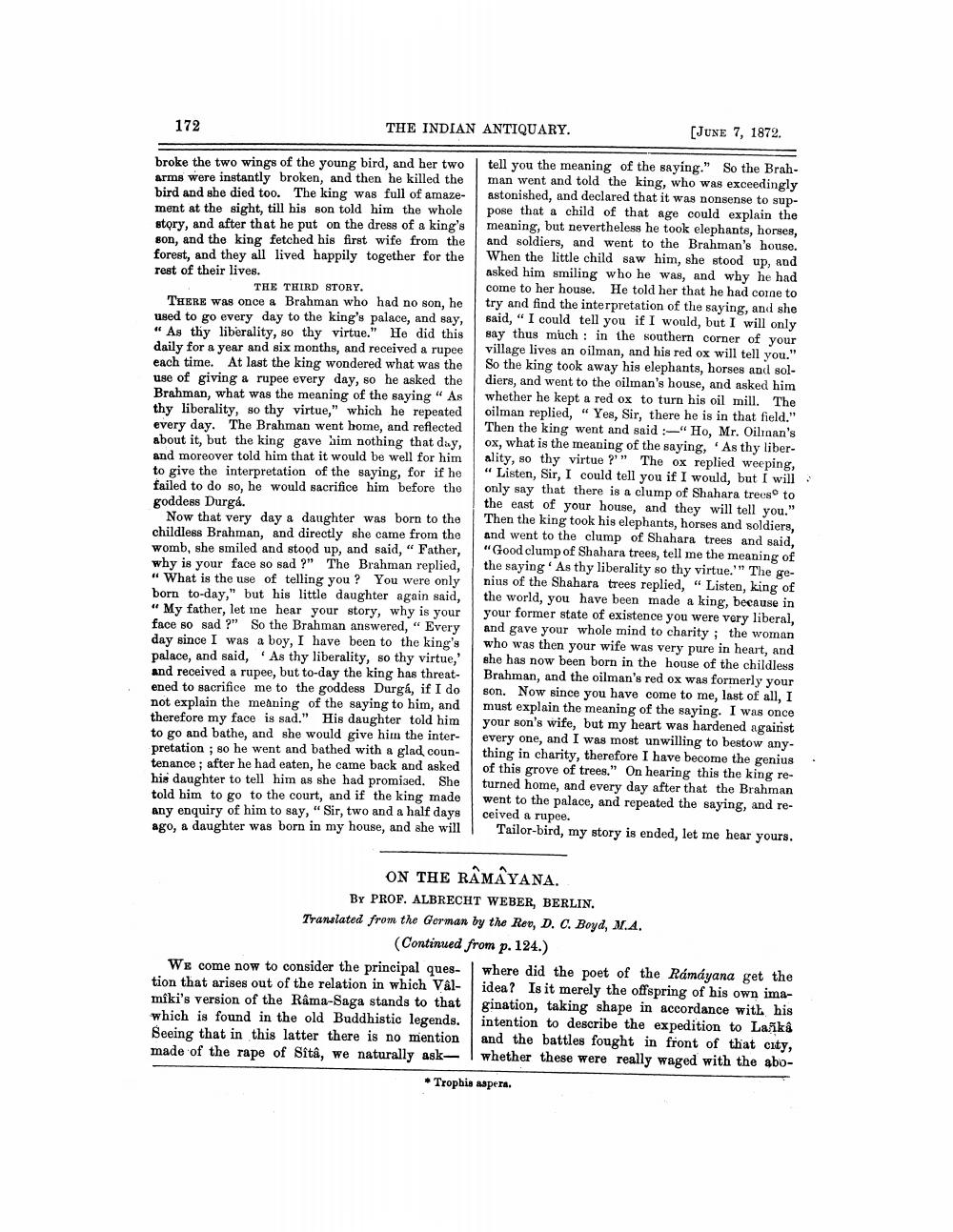________________
172
THE INDIAN ANTIQUARY.
[JUNE 7, 1872.
broke the two wings of the young bird, and her two arms were instantly broken, and then he killed the bird and she died too. The king was full of amazement at the sight, till his son told him the whole story, and after that he put on the dress of a king's Bon, and the king fetched his first wife from the forest, and they all lived happily together for the rest of their lives.
THE THIRD STORY. THERE was once a Brahman who had no son, he used to go every day to the king's palace, and say, " As thy liberality, so thy virtue." He did this daily for a year and six months, and received a rupee each time. At last the king wondered what was the use of giving a rupee every day, so he asked the Brahman, what was the meaning of the saying " As thy liberality, so thy virtue," which he repeated every day. The Brahman went home, and reflected about it, but the king gave him nothing that day, and moreover told him that it would be well for him to give the interpretation of the saying, for if he failed to do so, he would sacrifice him before the goddess Durga.
Now that very day a daughter was born to the childless Brahman, and directly she came from the womb, she smiled and stood up, and said, "Father, why is your face so sad ?" The Brahman replied, " What is the use of telling you? You were only born to-day," but his little daughter again said, “My father, let me hear your story, why is your face so sad ?" So the Brahman answered, " Every day since I was a boy, I have been to the king's palace, and said, 'As thy liberality, so thy virtue,' and received a rupee, but to-day the king has threatened to sacrifice me to the goddess Durgá, if I do not explain the meaning of the saying to him, and therefore my face is sad." His daughter told him to go and bathe, and she would give him the interpretation; so he went and bathed with a glad countenance; after he had eaten, he came back and asked his daughter to tell him as she had promised. She told him to go to the court, and if the king made any enquiry of him to say, "Sir, two and a half days ago, a daughter was born in my house, and she will
tell you the meaning of the saying." So the Brahman went and told the king, who was exceedingly astonished, and declared that it was nonsense to suppose that a child of that age could explain the meaning, but nevertheless he took elephants, horses, and soldiers, and went to the Brahman's house. When the little child saw him, she stood up, and asked him smiling who he was, and why he had come to her house. He told her that he had corne to try and find the interpretation of the saying, and she said, "I could tell you if I would, but I will only say thus much in the southern corner of your village lives an oilman, and his red ox will tell you." So the king took away his elephants, horses and soldiers, and went to the oilman's house, and asked him whether he kept a red ox to turn his oil mill. The oilman replied, "Yes, Sir, there he is in that field." Then the king went and said: "Ho, Mr. Oilinan's ox, what is the meaning of the saying, "As thy liberality, so thy virtue ?'” The ox replied weeping, "Listen, Sir, I could tell you if I would, but I will only say that there is a clump of Shahara trees to the east of your house, and they will tell you." Then the king took his elephants, horses and soldiers, and went to the clump of Shahara trees and said, "Good clump of Shahara trees, tell me the meaning of the saying As thy liberality so thy virtue.'" The genius of the Shahara trees replied, “Listen, king of the world, you have been made a king, because in your former state of existence you were very liberal, and gave your whole mind to charity; the woman who was then your wife was very pure in heart, and she has now been born in the house of the childless Brahman, and the oilman's red ox was formerly your son. Now since you have come to me, last of all, I must explain the meaning of the saying. I was once your son's wife, but my heart was hardened against every one, and I was most unwilling to bestow any. thing in charity, therefore I have become the genius of this grove of trees." On hearing this the king returned home, and every day after that the Brahman went to the palace, and repeated the saying, and received a rupee.
Tailor-bird, my story is ended, let me hear yours.
ON THE RAMAYANA. BY PROF. ALBRECHT WEBER, BERLIN, Translated from the German by the Rev, D. C. Boyd, M.A.
(Continued from p. 124.) We come now to consider the principal ques- where did the poet of the Ramayana get the tion that arises out of the relation in which Vâl- idea? Is it merely the offspring of his own imamiki's version of the Râma-Saga stands to that gination, taking shape in accordance with his which is found in the old Buddhistic legends. intention to describe the expedition to Lasika Seeing that in this latter there is no mention and the battles fought in front of that city, made of the rape of Sitâ, we naturally ask- whether these were really waged with the abo
• Trophis aspera.




